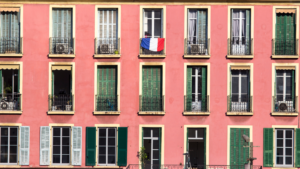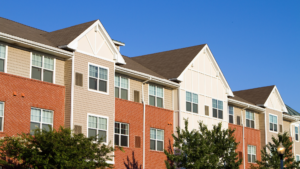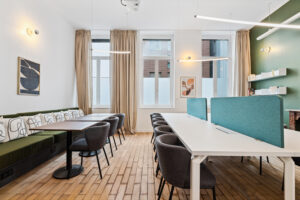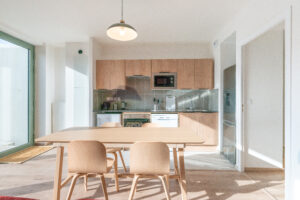Affordable Housing Solutions in France
France’s housing market is facing serious challenges, with rising costs and a limited supply of suitable housing options. As property prices and living expenses continue to climb, there’s a rapidly growing need for affordable housing solutions.
At Urban Campus, we’ve seen these issues firsthand and are committed to being part of the solution. Our background in creating community-focused living spaces has driven us to develop housing solutions that are affordable and holistically improve the lives of urban residents.
Let’s take a closer look at how our new affordable housing solutions will help to create a more balanced and inclusive market in France.
The State of Affordable Housing in France

First, let’s take a look at the current housing situation in France.
- High Costs and Limited Supply: Persistent issues of high costs and limited housing availability, particularly in urban areas, continue to strain the French housing market.
- Interest Rate Spike in 2022: The affordability crisis was exacerbated when interest rates sharply increased in 2022, putting additional pressure on potential homeowners and renters.
- Rising Homelessness: Over 330,000 individuals in France are homeless as of 2021, a significant increase from 143,000 in 2012, highlighting the growing severity of the housing crisis.
- Widespread Poverty: More than 9 million people lived below the poverty line in 2021, demonstrating widespread economic challenges.
- Social Housing Backlog: Approximately 2.4 million households are on the waiting list for social housing, yet only 3% of these applicants are deemed eligible due to stringent criteria.
What is Intermediate Rental Housing?

Intermediate rental housing, or “logement locatif intermédiaire” is a housing model that emerged as a response to the growing divide in the housing market. It aims to serve a demographic that falls between the typical beneficiaries of social housing and those who can comfortably afford market rates. This segment includes middle-income earners, often referred to as the “missing middle,” who earn too much to qualify for social housing but not enough to compete in the increasingly expensive private rental sector.
In many European countries, including France, the concept of Intermediate rental housing has been developed to address this gap. It’s more than just a temporary solution; it’s a strategic way to offer more housing choices and promote social integration. By offering rents that are approximately 10-15% below the market rate, IRH makes living in urban centers more accessible to those who might otherwise be priced out of these areas.
Intermediate Rental Housing in France
In recent years, the importance of IRH in France has become increasingly recognized amidst escalating housing prices and urban gentrification. The French government and private developers have both taken steps to promote this type of housing:
- Legislative Support: Various legislative measures have been introduced to encourage the development of IRH. These include tax incentives for developers and simplified zoning laws to expedite the construction process.
- Local Initiatives: Some regions and cities have implemented local initiatives to incorporate IRH into their urban planning strategies. For example, cities like Paris have allocated specific quotas of new developments to be designated as intermediate rental housing.
- Public-Private Partnerships: There has been an increase in partnerships between public entities and private developers to fund and manage IRH projects.
- Market Response: The market has responded positively to IRH, with a growing number of developers recognizing the potential for stable returns on investment through socially responsible development practices.
Urban Campus’ Role in Pioneering Affordable Housing Solutions

At Urban Campus, we have recognized the pressing need for affordable housing solutions and have positioned ourselves at the forefront of addressing this challenge. Our approach involves more than merely providing housing; it’s about creating vibrant, sustainable communities that holistically enhance the lives of their residents.
Innovative Housing Projects and Community Integration
Our projects integrate affordable housing with high-quality living environments, specifically designed to meet the dynamic needs of modern urban dwellers. By developing managed intermediate housing and service-oriented residences, we cater to a broad spectrum of the population who seek both affordability and quality. Romain Crépel, our Director of Urban Campus in France, emphasized this strategy, stating, “Our mission is not only to provide a roof but also to create environments where people can truly live well and connect with others.”
Tailored Living Solutions
Each Urban Campus residence is meticulously designed to promote flexibility and a sense of community. Our residences feature shared coworking spaces, which cater to the growing number of remote workers and freelancers looking for a productive and collaborative work environment outside of a traditional office. Fitness centers and communal kitchens are also standard, providing spaces where residents can take care of their health and share meals, fostering strong communal bonds.
Cost-Effective Community Living
These shared amenities are more than just conveniences; they represent a fundamental shift towards a shared economy in housing. By pooling resources, our residents can enjoy higher-quality facilities at a lower cost than they would manage individually. “The integration of these communal spaces is key to reducing living costs while enhancing the quality of life,” Romain noted in a recent interview. “It’s about smart living where costs are shared, and every square meter is optimized for maximum utility and comfort.”
Sustainable and Socially Responsible Approaches
Sustainability is at the core of our operations at Urban Campus. We believe in building not just for today, but for the future. Our designs incorporate eco-friendly materials and technologies, reducing the environmental impact of our buildings and promoting long-term sustainability. Moreover, by fostering socially integrated communities, we are actively contributing to the social fabric of the cities we operate in. As Romain notes, “Urban Campus is not just about building homes, it’s about crafting ecosystems that thrive on mutual support and collective well-being.”
The Growth and Expansion of Urban Campus

As Urban Campus continues to grow, we are proud to build upon our successful operations in coliving, now expanding our horizons into multifamily units, flex living, and affordable housing initiatives. Our journey began with revolutionizing coliving spaces, where we crafted communities centered around shared experiences and mutual respect. Today, we are taking that expertise and applying it to a broader range of housing solutions, each designed to meet diverse needs and lifestyles while upholding our commitment to social responsibility.
Our expansion is driven by a vision where everyone has access to affordable, quality housing that enhances community and personal well-being. We are dedicated to innovating in ways that respect both the environment and the communities we serve, ensuring that as we grow, we also uphold high standards of social responsibility. This commitment is not just a part of our business model; it’s at the heart of every project we undertake, guiding us to make a meaningful impact in the cities we touch.
Read more about our Affordable Housing Solutions in France
- Romain Crépel on Intermediate Rental Housing – Business IMMO
- Romain Crépel on Intermediate Rental Housing – Journal du Net
Photo Credits:
- Photos 1 & 2 used through Canva Free Media License